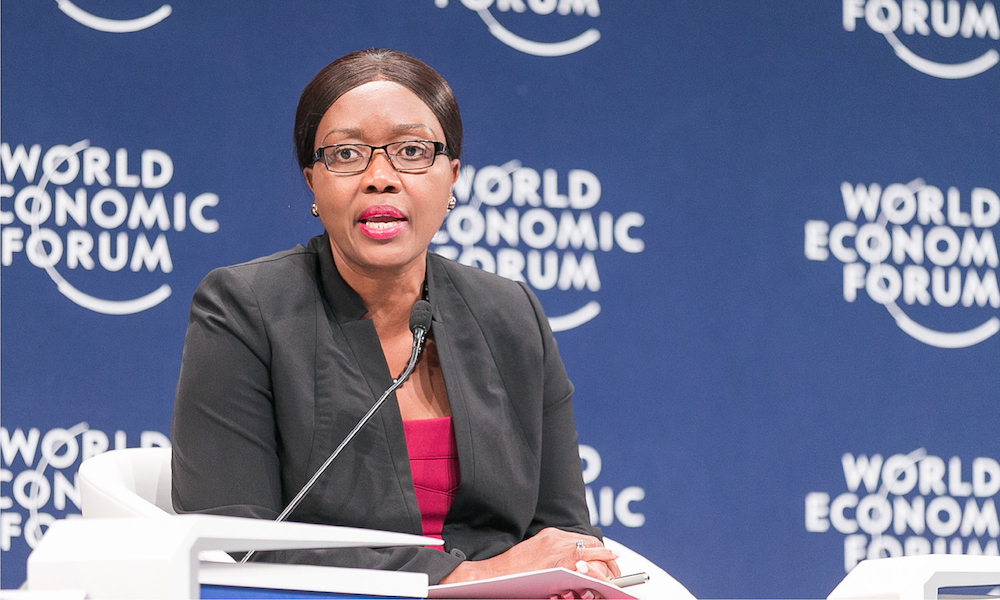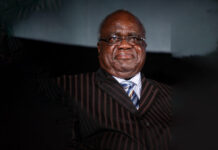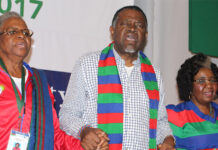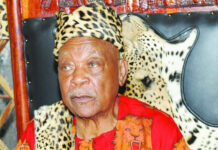By Sonja Smith, Tileni Mongudhi |17 June 2022
PRIME minister Saara Kuugongelwa-Amadhila has told close confidants she wants to challenge for the Swapo vice president position – taking her one step closer to the Presidency.
This comes after former president Sam Nujoma (93) in March called for the next president to be a woman.
Nujoma has sponsored and helped propel the prime minister’s political career in Swapo and the government since she was a youth.
President Hage Geingob has not yet indicated who he would be supporting, but indications are that people in his inner circle may prefer Kuugongelwa-Amadhila.
She is said to be planning how she will announce her candidature.
Becoming Swapo’s vice president would make her Geingob’s likely successor.
Born in 1967 at Otamanzi near Okahao in the Omusati region as the youngest of five children, both of her parents had died by the time she was 12.
Her father, Fillemon Kuugongelwa, a contract labourer at Oranjemund, died when she was nine.
Shortly thereafter she lost her mother, Alina Shikongo, a school principal.
The struggle adopted her.
In 1980 she made the journey across the border to Angola.
An ex-combatant at a Swapo refugee camp in Lubango remembered her as “a quiet girl, who wore a red dress and always had her Bible with her”.
The movement saw something in her.
They sent her to Sierra Leone for high school, where she discovered an interest in economics that set the stage for her university studies and eventually her political career.
After independence, she scored a scholarship at Lincoln University in Pennsylvania, where a fellow Namibian student in the United States remembers, “she was always reading and studying”.
After graduation, Kuugongelwa-Amadhila got a job as a desk officer in Sam Nujoma’s office.
Her rise was rapid and pushed by Nujoma. In 1995, when she was 27 years old, he appointed her to the National Assembly and gave her a Cabinet position as head of the National Planning Commission.
In 2003, Nujoma appointed Kuugongelwa-Amadhila as minister of finance – a job she kept until 2015.
Then, at 48, Geingob appointed her as prime minister – making her the youngest person to hold the job.
Now she’s tipped as a potential successor to Geingob when he steps down in 2025.
Kuugongelwa-Amadhila’s reaction to detailed questions sent to her in May was: “Your mailed questions . . . contain inaccurate information, which does not in any way represent my political journey.
“Your questions are filled with seemingly willful misrepresentations and insinuations, suggestive of subjectivity and malicious intent, which are incompatible with an objective and credible publication.
“As such, they cannot be the means to get the necessary information to compile an accurate and objective personal profile.”
Kuugongelwa-Amadhila could soon square off against deputy prime minister Netumbo Nandi-Ndaitwah for Swapo’s vice presidency.
Other contenders could be minister of defence and veterans affairs Frans Kapofi and minister of mines and energy Tom Alweendo.
Nandi-Ndaitwah is supported by former president Hifikepunye Pohamba.
Despite Nujoma’s support for Kuugongelwa-Amadhila, Geingob allegedly has some reservations about her leadership skills.
SECRETIVE
Institute for Public Policy Research (IPPR) director Graham Hopwood says Kuugongelwa-Amadhila has an advantage in terms of her age, being 54.
“Most of her rivals are considerably older and could be considered as past their sell-by dates,” he says.
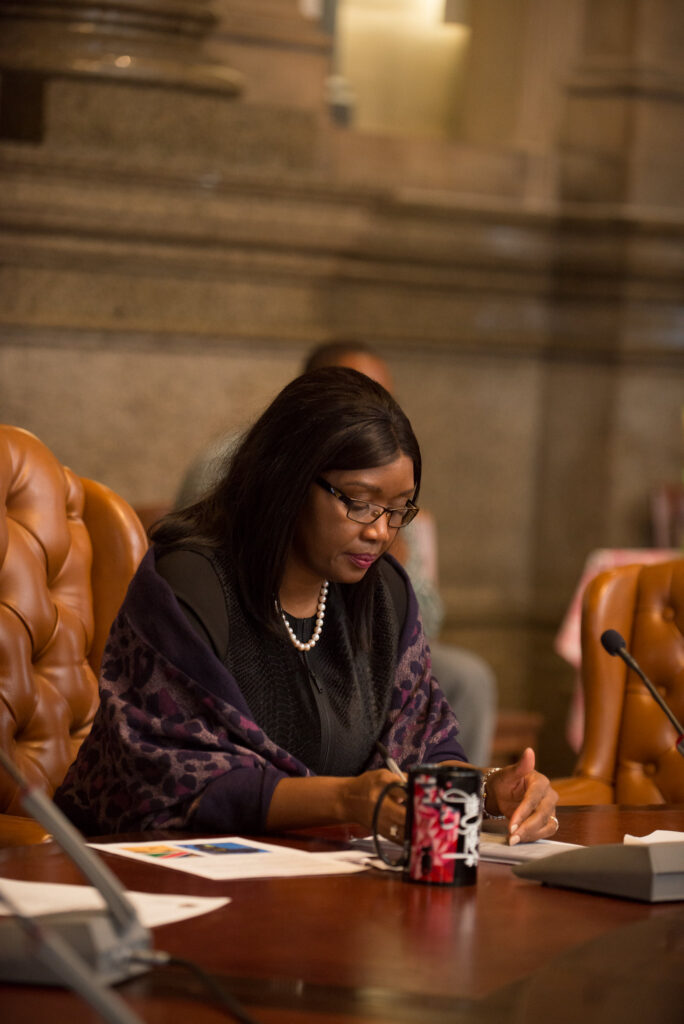
However, her technocratic abilities are undermined by her lack of political charisma, he says.
“She often comes across as defensive and less than forthcoming on information relating to sensitive matters. Media reports over the past few years which have linked her husband to alleged irregularities have also not helped her reputation,” Hopwood says. Geingob has made transparency a priority, while Kuugongelwa-Amadhila is viewed by some in the party as too “secretive and unpredictable”.
Her former colleagues say she is a diligent technocrat.
“During the years I’ve worked with her, and especially during the days drawing closer to the tabling of the national budget, she would come down to the office where the budget books are being compiled and would edit the documents herself with a red pen,” says Ericah Shafudah, former executive director of finance, who has worked with Kuugongelwa-Amadhila for many years. Friends say she’s more personable than her public persona would suggest.
“She loves music and likes to sing,” Shafudah says.
The executive director in the prime minister’s office, I-Ben Nashandi, has also worked with Kuugongelwa-Amadhila at the finance ministry.
He describes her as a “passionate professional”.
She often works into the night, pays attention to detail and wants clear communication, he says. According to Nashandi, his boss accommodates dissenting views before finding a solution.
“Allowing for different views does not make her weak. She just wants to ensure the best possible solution before making a decision,” he says.
KEEPER OF THE PRIVY PURSE
When Kuugongelwa-Amadhila became finance minister, she was a political novice with no support base.
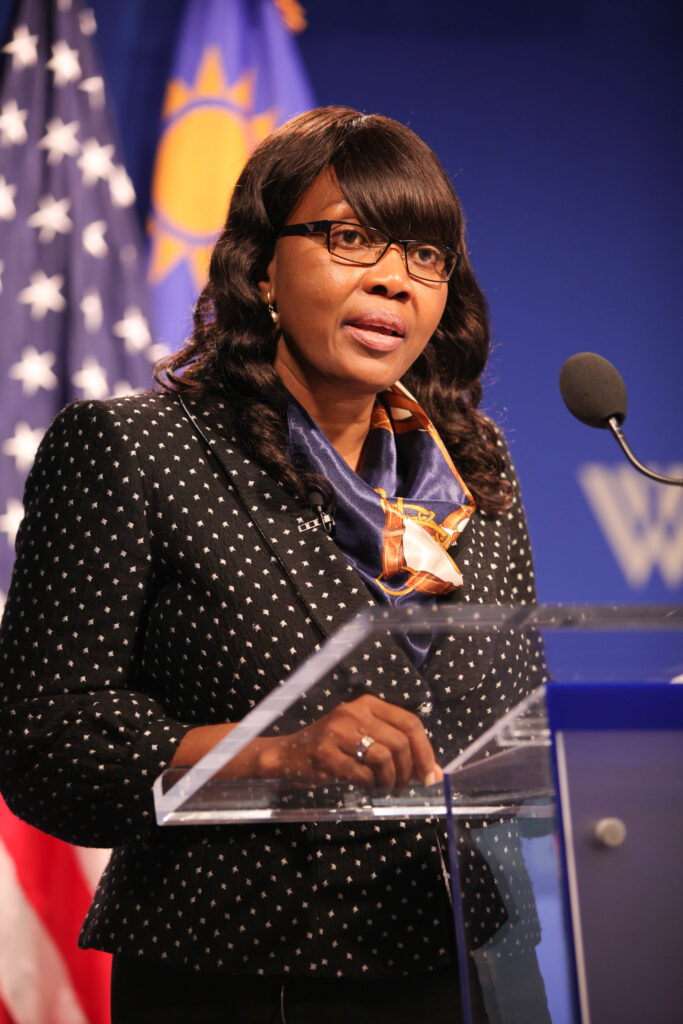
Yet, in the 2006/7 financial year, she turned the government’s budget deficit into a surplus, gaining credit for having rescued the government from a financial bind.
But that discipline withered under Pohamba.
Kuugongelwa-Amadhila’s alleged inability to face political adversity meant she would sometimes sign off on grandiose capital projects, even when she knew the government could not afford it.
Pohamba’s pressure is now believed to have played a significant role in the country currently owing N$110 billion.
Three years into Pohamba’s presidency, Kuugongelwa-Amadhila still ran a tight fiscal ship, with government debt standing at N$13 billion.
By the time Pohamba left office in 2015, the government’s debt had risen to N$56 billion.
Pohamba’s administration em- barked on wasteful projects, such as the Targeted Intervention Programme for Employment and Economic Growth (Tipeeg) and mass a housing initiative.
To pay for these schemes, Pohamba’s government borrowed money from abroad – a significant chunk being the 2011 Eurobond, which has raised US$500 million (N$7,1 billion).
The two projects flopped amid reports of corruption, with taxpayers left to settle the hefty bill.
Barely a year after Pohamba left the government, the country was struggling to meet its debt obligations, small businesses were closing, and unemployment was rising.
The government was running out of cash and minister Calle Schlettwein, Kuugongelwa-Amadhila’s successor at the Ministry of Finance, subsequently instituted austerity measures.
ON THE EDGE
Early into her role as finance minister, Kuugongelwa-Amadhila allegedly tried to move into the private sector.
Sources say she came second to the late Ovaherero chief Vekuii Rukoro in the race to lead First National Bank Namibia in 2006.
Her allies said she wanted a career switch to gain experience outside the government.
Others speculated that she had grown frustrated working with Pohamba.
Two years later, Kuugongelwa- Amadhila dropped a bombshell on the eve of the 2009 Swapo electoral college – an internal election of the ruling party leaders who would rep- resent Swapo in parliament.
The prime minister is said to have written to the party secretary general asking to be removed from the internal election.
Three sources say she was trying to get out of politics, but was later convinced to stay.
Other sources say she was trying to avoid getting her hands dirty with campaigning for positions, risking a humiliating loss.
Three days later, when the con- test was done, Pohamba named Kuugongelwa-Amadhila on the list of 10 people appointed by the party president.
As a result, she appeared at number 24.
Years later, Kuugongelwa-Amadhila was still not popular in the party. This was obvious at the 2012 congress when she didn’t make it to the party’s politburo.Again, she had to rely on Pohamba.
Kuungongelwa-Amadhila has over the years avoided publicly taking sides in party factional battles.
She did the same after the 2017 Swapo congress which turned out as perhaps the most divided, with allegations of vote buying and money laundering.
It allegedly often took last-minute intervention by Nujoma to lobby for the prime minister in Swapo’s internal elections.
“We didn’t even know what she believed in or where she stood,” a delegate to the congress says.
A Swapo leader says the prime minister does not mingle or lobby for her votes, nor does she build allegiance with any of her comrades.
“She sits there and expects her votes to come from heaven,” the leader says.
SOFT TARGETS
Kuungongelwa-Amadhila had to learn how to survive in the male- dominated world of politics as she rose in the corridors of power.
Her colleagues accused her of fail- ing to rein in some Cabinet members when they transgressed, especially during the deliberative sessions she chaired.
She sometimes seemed reluctant to stand her ground on key national issues when put under pressure by her bosses and political colleagues.
Former minister of justice Sacky Shanghala and director general of the National Planning Commission Obeth Kandjoze, who was the then minister of mines and energy, are said to have undermined her authority as prime minister.
At the time, they were seen as Geingob’s favourites.
Kandjoze yesterday said: “I can confirm the allegation by your un- known and undeclared source is a desperate and pathetic lie.”
Sources claim Kandjoze and the prime minister have reconciled.
This reluctance has also been observed in the National Assembly, where Kuungongelwa-Amadhila was seen as one of the few Swapo members of parliament who capitalised on the party’s majority to shut down the opposition.
These complaints have earned her the reputation of only targeting the weak and politically vulnerable.
TAINTED
The prime minister has faced several accusations during her time in office.
As finance minister, Kuugongelwa- Amadhila was accused of forcing the Development Bank of Namibia into a N$4 billion debt due to a project that was not urgent and to a state entity that had no obligation to pay back the money.
That debt resulted in the oil storage facility of which the cost has increased to N$6,5 billion amid concerns of negligence from government officials such as Kuugongelwa- Amadhila.
She has, however, denied any wrongdoing.
Other controversies include her husband, businessman Onesmus Tobias Amadhila.
Last year, the media reported that he was getting preferential treatment from the Development Bank of Namibia while his wife was the finance minister and overseer of the state-owned bank.
The Namibian has also reported that the bank has been reluctant to take action against him while he defaults on his loans totalling N$180 million.
Kuugongelwa-Amadhila was also implicated in a farm deal that saw her profit from the sale of farms to the government.
In 2011, the couple bought two farms for N$5,5 million near Grootfontein.
They sold the two farms to the government for N$14,4 million – making a N$8,9 million profit.
She now has only a few months to convince her fellow Swapo members to overlook these scandals.
If it goes according to her plan, Kuugongelwa-Amadhila could be Namibia’s first woman president.
*This article was produced by The Namibian’s Investigative Unit as part of a series of profiles on people of interest in national affairs.

